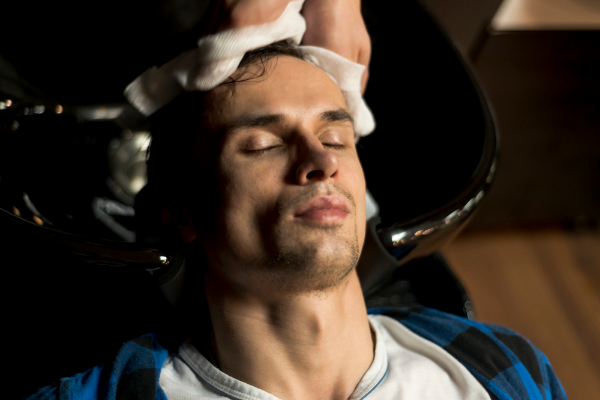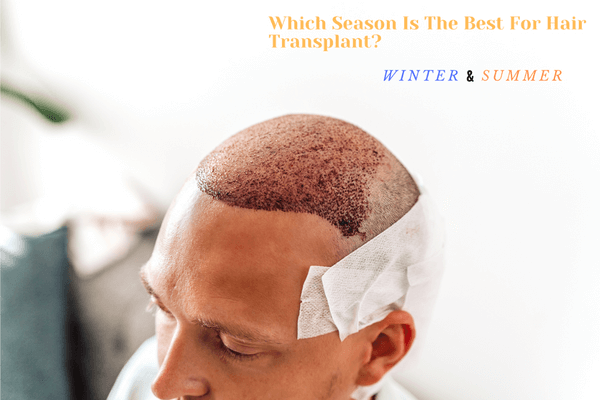
Washing and Care Recommendations After Hair Transplant
The post-hair transplant care process is as important as the hair transplant procedure itself. Proper care after the transplant ensures the optimal results and promotes healthier and faster hair growth. Therefore, it requires careful attention. We have prepared a monthly hair transplant care routine for you to follow. By following these recommendations, you can achieve fantastic results. We wish you all happy reading in advance.
Post-Hair Transplant Care Recommendations
Post-hair transplant care is crucial for both the DHI technique and the FUE technique. It accelerates the healing process in the treated area and promotes healthy and rapid hair growth. Let’s examine the post-care processes for FUE and DHI hair transplants day by day.
Days 1 to 8
The 8-day period following the hair transplant is one of the most critical phases in terms of post-transplant care. During this period, the first visit to the hair transplant clinic is important to perform the initial check-up after the surgery. During this check-up, the hair transplant surgeon applies an antiseptic to the transplanted area to prevent any potential infection. This antiseptic protects the hair follicles against possible microbes. Subsequently, the headband that prevents swelling of the face is removed, and the patient prepares for the first hair wash. Additionally, during this period, it is necessary to sleep with a special pillow to prevent any harm to the grafts. This significantly reduces the risk of graft damage. Moreover, to prevent swelling on the forehead caused by the procedure, a clean cloth with ice can be gently applied as a compress.
Days 8 to 30
Between days 8 and 30, the patient can gradually return to their normal daily activities. During this period, scabbing and itching in the transplanted area start to diminish and heal. However, it is still important to avoid excessive exposure to sunlight and rain. The transplanted area is in the early stages of recovery, and such conditions can hinder the healing process. Additionally, to prevent dryness in the area, natural oils such as calendula oil, as well as baby oil or creams with aloe vera formula, which are irritation-preventing products, can be applied. This ensures continuous moisturization of the area. During this period, all hair dyes, waxes, gels, combs, or brushes should be avoided as they can cause significant damage to the transplanted hair. Special shampoos with formulations containing argan, sesame, or coconut oil can be used. This helps moisturize the transplanted area and cleanse the scalp from dirt. Furthermore, under the supervision of a pharmacist or doctor, natural oil supplements consisting of probiotics, minerals, and vitamins can be used to promote faster follicle growth.
Months 1 to 3
During the 1 to 3-month period, minor shedding may occur in the transplanted area, which is a normal process. After shedding, new hair starts to grow after 3 months. Small white dots may appear on the scalp during the growth process, which will turn red later on. These red dots will indicate the areas where the hair follicles will grow. It is normal to experience mild numbness during this period, which will subside by the end of the second month. Throughout this period, it is important to provide ample ventilation to the scalp as the hair roots need sufficient oxygen during this phase. However, protection from the sun is still necessary. Finally, during this period, it is important not to use anything that restricts airflow to the hair, such as motorcycle helmets or hats. Additionally, activities such as swimming, pool use, and sauna should be avoided.
The complete healing process in hair transplantation is observed during the period of 8 to 12 months, which comes after 3 months.
Additionally, it is important to pay attention to the post-hair transplant care factors mentioned below.
Diet – Sleep – Habits
- In the first few weeks, it is essential to use the special pillows recommended by the doctor.
- When lying on your back or in a semi-reclined position, make sure to use a soft fabric such as a neck pillow or a towel to support the back of your head.
- For the first 3 days, it is crucial to avoid excessively salty, spicy, and oily foods like olives, cheese, pickles, chips, and seeds.
- Additionally, for one week, it is important to stay away from substances that can hinder hair follicle growth, such as alcohol, cigarettes, and hookah.
| Process | Caffeine and Coffee Use | Salt Consumption in Meals | Consumption of Olives, Pickles, Chips, etc. | Lying to the right and left | Akol Usage | Cigarette and Hookah Consumption |
| Day 3 | ❌ | ❌ | ❌ | ❌ | ❌ | ❌ |
| Day 5 | ❌ | ❌ | ❌ | ❌ | ❌ | |
| Day 7 | ❌ | ❌ | ❌ | |||
| Day 10 | ||||||
| Day 15 | ||||||
| Day 30 | ||||||
| Day 90 |
Clothing
- In the first 3 days, it is important not to touch the transplanted area in any way. Additionally, nothing that restricts airflow should be worn.
- During the following 3 days after the operation, it is advisable to wear front-buttoned or comfortable clothing.
- Hairbands can be used from the first wash onwards.
- For sports caps, it is recommended to wait for one week, for beanies 10 days, and for helmets, it is advised to wait for 30 days.
| Process | Big Fisherman’s Hat | Baseball, Sports cap | Beanie | Front Buttoned Garments | Helmet |
| Day 3 | ❌ | ❌ | ❌ | ❌ | ❌ |
| Day 5 | ❌ | ❌ | ❌ | ❌ | |
| Day 7 | ❌ | ❌ | ❌ | ❌ | |
| Day 10 | ❌ | ❌ | ❌ | ||
| Day 15 | ❌ | ||||
| Day 30 | ❌ | ||||
| Day 90 |
Water Exposure
- You can go swimming in the sea 10 days after a hair transplant using the FUE or DHI method.
- For hair washing, it is recommended to use lukewarm water for up to 15 days.
- It is ideal to wait for 15 days before engaging in activities such as hot showers, sauna, and Turkish bath.
- Due to the presence of chlorine, it is advised not to use the swimming pool for one month.
| Process | Sea | Hammam, Sauna, Hot Shower | Pool |
| Day 3 | ❌ | ❌ | ❌ |
| Day 5 | ❌ | ❌ | ❌ |
| Day 7 | ❌ | ❌ | ❌ |
| Day 10 | ❌ | ❌ | |
| Day 15 | ❌ | ||
| Day 30 | |||
| Day 90 |
Physical Activities
- For the first 3 days after hair transplantation, it is advised to avoid sexual intercourse.
- Avoid activities that require bending for 5 days.
- Heavy lifting should be avoided during the first week after hair transplantation.
- During the initial 7-day period, it is important to avoid sweating. If sweating occurs, it should be gently dried with paper towels.
- Light activities can be resumed 10 days after the operation, while strenuous activities can be resumed after 15 days.
- For contact sports such as martial arts and football, it is recommended to wait for a period of 90 days.
| Process | Sexual intercourse | Activities that require bending | Lifting Heavy Things | Light Sports | Heavy Sports | Defense Sports and Football |
| Day 3 | ❌ | ❌ | ❌ | ❌ | ❌ | ❌ |
| Day 5 | ❌ | ❌ | ❌ | ❌ | ❌ | |
| Day 7 | ❌ | ❌ | ❌ | ❌ | ||
| Day 10 | ❌ | ❌ | ❌ | |||
| Day 15 | ❌ | ❌ | ||||
| Day 30 | ❌ | |||||
| Day 90 |
Haircut/Hair Coloring
- If you wish to style your hair after the procedure, it is recommended to wait for a period of 10 days. After 10 days, you can trim the sides of your hair with scissors.
- For procedures that directly penetrate the hair roots, such as hair drying or coloring, it is necessary to wait for 3 months.
- After 3 months, you can use products like wax, tonic, gel, pomade, and hairspray. However, care should be taken to avoid direct contact with the scalp. It is also advisable to wash the hair directly before going to bed.
- Approximately 3 months after hair transplantation, you can use a trimmer or razor for shaving purposes.
| Process | Shaping with Scissors | Hair Dryer Usage | Natural dye | Wax, tonic, jelly, pomade, spray | Shaving machine | Razor |
| Day 3 | ❌ | ❌ | ❌ | ❌ | ❌ | ❌ |
| Day 5 | ❌ | ❌ | ❌ | ❌ | ❌ | ❌ |
| Day 7 | ❌ | ❌ | ❌ | ❌ | ❌ | ❌ |
| Day 10 | ❌ | ❌ | ❌ | ❌ | ❌ | ❌ |
| Day 15 | ❌ | ❌ | ❌ | ❌ | ❌ | |
| Day 30 | ❌ | ❌ | ❌ | ❌ | ❌ | |
| Day 90 | ❌ | ❌ | ❌ | ❌ | ❌ |
After Hair Transplantation Washing Tips
Post-care after FUE hair transplantation and DHI hair transplantation should be done with great care. Therefore, the first washing should be done at the clinic where you had the hair transplant. This is because post-transplant care products are more professional, allowing nourishment for your hair.
If the hair transplant care is performed at the clinic, firstly, a lotion is applied to the transplanted area. This lotion nourishes the scalp. Then, special foam shampoo is used to wash the patient’s scalp. During this process, the foam is gently applied to the scalp in soft, tapping motions. No rubbing or massaging should be done as it may harm the transplanted area. Afterwards, the hair is rinsed with lukewarm water. It is important to adjust the water pressure correctly. Then, the scalp is gently dried with a paper towel.
On the 4th and 5th days, the cleaning of the scalp can be done by the patient. The patient should use the shampoo recommended by the doctor for hair transplant care. During this process, the scalp should be washed with gentle and soft movements.
- Multivitamin Tablet
Multivitamin tablets are one of the essential support care products to be used after FUE and DHI hair transplantation. These multivitamin tablets, used after male and female hair transplantation, help strengthen the hair follicles and promote the rapid growth of hair follicles. Thus, a healthy hair transplant process is achieved in a short period of time.
- Hair Shampoo
Hair shampoo is one of the most important aspects of post-transplant care products and should have a natural composition. It should contain ingredients such as B5, Keratin, Collagen, Provitamin, Sodium DNA, and Biotin, which are beneficial for hair. This prevents scalp redness and irritation.
- Hair Serum
Hair serums are auxiliary products that support post-transplant hair care. Hair serums can be used 14 days after the transplantation. This helps the grafts attach to the hair follicles and facilitates their nourishment. Hair serums provide faster results compared to other post-transplant care products. When choosing a hair serum, make sure it contains hair-friendly ingredients such as biotin, Provitamin, B5, Sodium DNA, Hyaluronic acid, and AnaGain, which protect and nourish the hair.
- PRP
PRP (Platelet Rich Plasma) is a plasma solution enriched with platelets, which are clotting cells in the blood. This solution is obtained from the patient’s own blood and contains natural growth factors present in the body. This solution is directly injected into the patient’s hair follicles to support natural nourishment and accelerate the healing process.
- Anti-Hair Loss Spray
Anti-hair loss sprays should be used as a supportive measure in post-transplant care routines. These sprays should be applied starting from the 1-month mark after the transplantation to prevent shock hair loss. Additionally, herbal-based anti-hair loss sprays nourish the hair roots and enhance blood circulation, leading to faster hair growth.
- Antibiotic Use
Antibiotic medications and creams are essential support products to be used after FUE and DHI hair transplantations. Antibiotic-based medications and creams help prevent potential infections and ensure a smooth healing process. This promotes complete recovery of the hair follicles.
- Biotin
After 1 month of hair transplantation, it is highly recommended to include biotin-containing dietary supplements in the care routine. Biotin supplements strengthen and improve the quality of hair.
- Dermaroller
Dermaroller is an important detail that should not be overlooked in post-transplant care routines after a hair transplantation surgery. Dermaroller is generally a tool that allows massaging the scalp, which accelerates blood circulation in the scalp and promotes faster hair growth in the transplanted area. However, when using a dermaroller, it is important to wait at least 45 days after the transplantation procedure.
You can browse our turkey hair transplants page and contact us for the hair transplant process and all the questions you have in mind.
Frequently Asked Questions
How Often Should You Wash Your Hair After Hair Transplant?
After the hair transplant process, it is recommended to wash the hair every 2-3 days during the 10-day period following the procedure. The main reason for this is to maintain the natural oil balance of the scalp and prevent excessive drying of the scalp. It also helps prevent itching issues.
Should You Use Caffeine Shampoo After Hair Transplant?
Although using caffeine shampoo is not highly recommended in the initial stages of hair transplant care routines, there haven’t been observed any issues with using caffeine shampoo after 2 weeks of the transplant. However, if you want to use caffeine shampoo, it is advisable to consult with your doctor.
Can I Use Hair Care Oil After Hair Transplant?
After hair transplant, the hair follicles and scalp are sensitive, so heavy oils or thick lotions can potentially harm the transplanted hair and delay the healing process. Additionally, some oils may irritate the scalp and cause itching. Therefore, it is recommended to use natural and gentle hair care oils under the supervision of a doctor.












